Defusing Carbon Bombs in Africa
By Aleksander Esmann
HAF Intern
The webinar “Defusing Carbon Bombs in Africa” was part of the webinar series “Towards Defusing Global Carbon Bombs”, which was organized in collaboration between the Climate Action Network International (CAN), the Leave It In The Ground Initiative (LINGO) and regional partners, and it took place on April 18, 2023.
This session covered the importance of identifying and defusing carbon bombs on the African continent to reverse climate change, protect the environment and to improve the living situation of the local population.
The climate emergency needs a new response from global society: defusing carbon bombs, the biggest fossil fuel projects in the world, which emit more than 1 Gigaton (1 billion tons) of CO2 over their lifetime. LINGO, Global Energy Monitor and Urgewald have published a global list of over 400 projects (half coal, half oil & gas) and the analysis shows that the CO2 emissions of these projects would take us way beyond the 1.5°C goal. We need to pay more attention to them and develop strategies to prevent the implementation and the disastrous consequences of these projects.
Kjell Kühne, the director of LINGO, started the session by presenting the current situation regarding carbon bombs in the whole world and then in Africa specifically.
On an important sidenote: The High Atlas Foundation is very grateful to have partnered with LINGO, Germanwatch, GreenFaith, Ummah for Earth, the The Faculty of Islamic Law at University Sidi Mohammed Ben Abdellah on the International Conference on Islam and Climate Emergency in Fes that took place this past February. Our shared public statement reflects the common understanding reached by the Islamic and climate scholars over the course of the three days.
There are 425 projects considered carbon bombs all over the world. However, 40% of these are new projects which means that they are only in the planning or construction phase.
This gives initiatives such as LINGO more possibilities to fight these projects to prevent their implementation and protect the climate and environment.
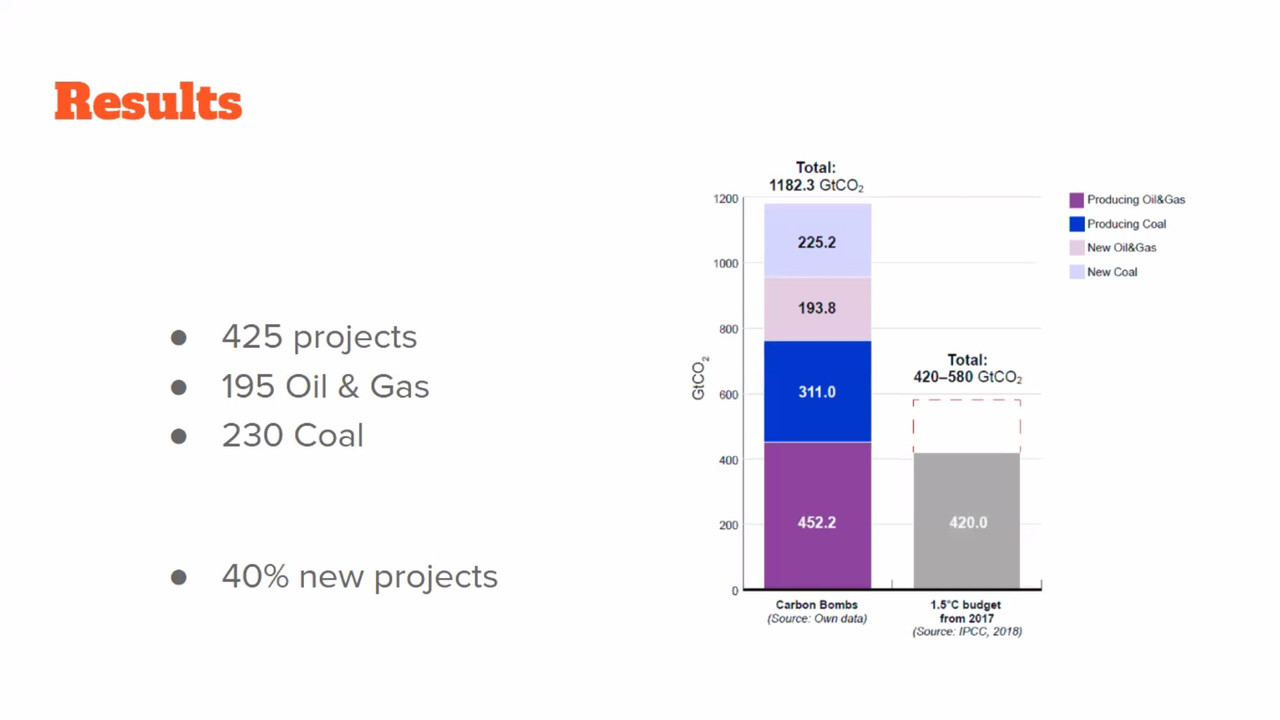
If no new carbon bomb projects were to be added to the current ones, we would have a 50% chance of actually reaching the 1.5°C target set by the Intergovernmental Panel on Climate Change. Otherwise, staying below 1.5°C of global warming is virtually impossible.
Kühne´s research on this topic was featured in a Guardian article about carbon bombs. There he exposed world leaders who, shortly after backing more climate action at the Climate Summit in Glasgow, enabled huge new oil, gas and coal projects, which will continue to drive up global warming and environmental pollution all over the world.
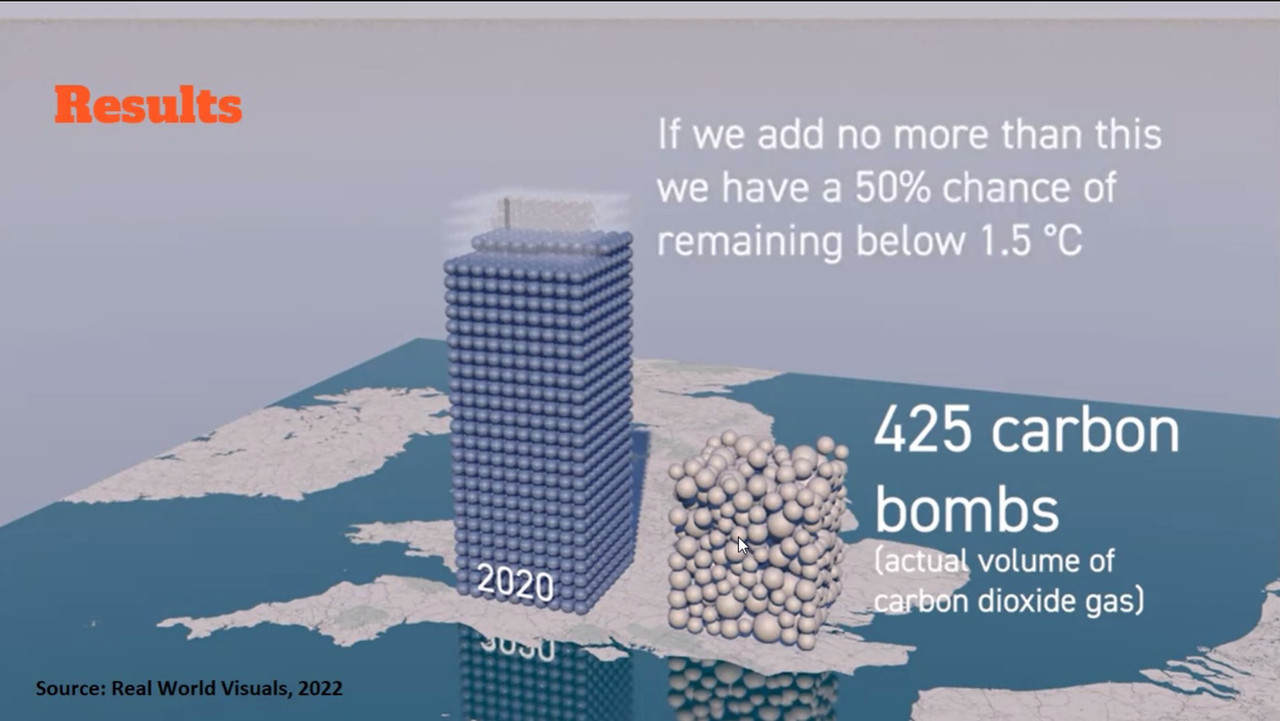
To defuse these carbon bombs LINGO has developed a three-step approach: Identify, Understand and Defuse.
In these graphics, the major carbon projects in the world and in Africa can be seen:
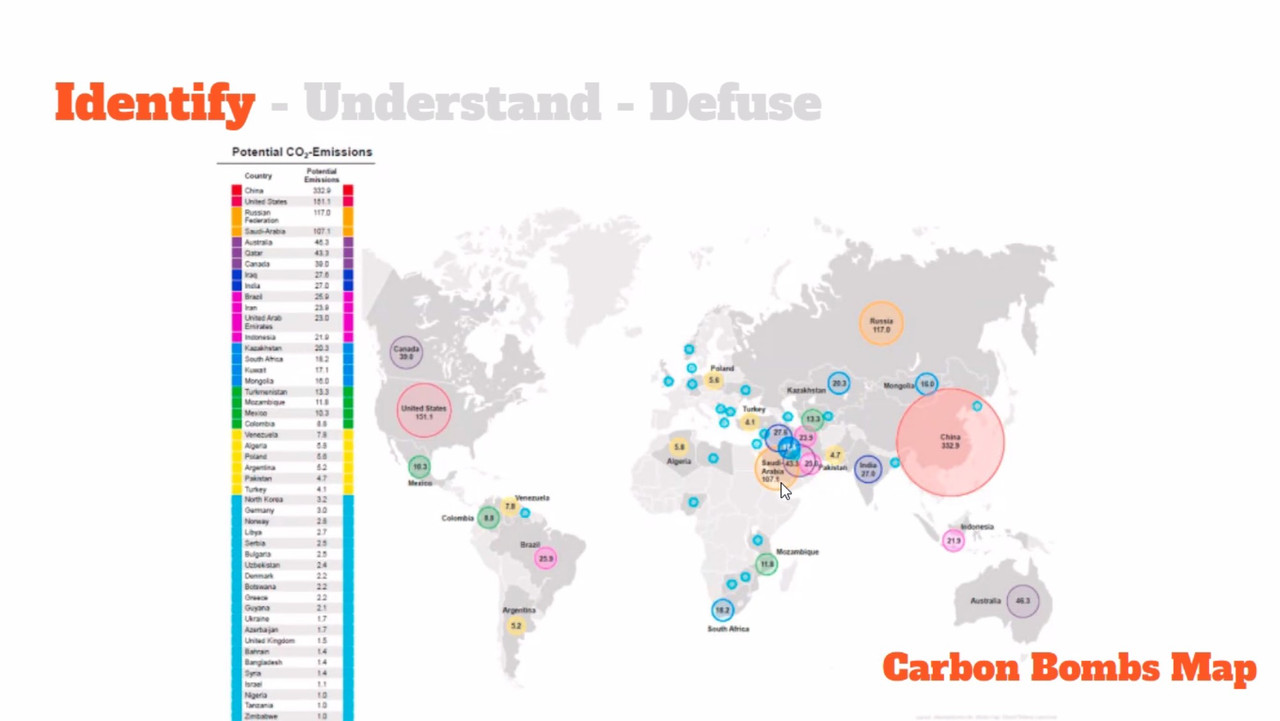
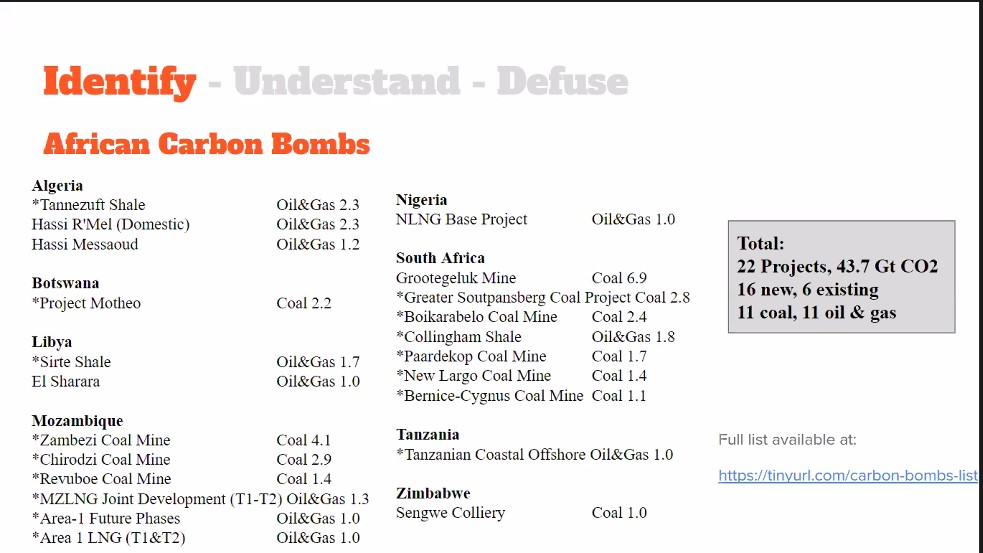
The International Energy Agency has stated that there is no need for the construction of new fossil fuel projects. Instead, current projects should be put into harvest mode where they are kept running until the end without additional expansion to bridge the transition phase to a carbon neutral society in the future. Alternatively, projects such as coal mines with a particularly bad impact on the environment should be shut down early to mitigate potential damages.
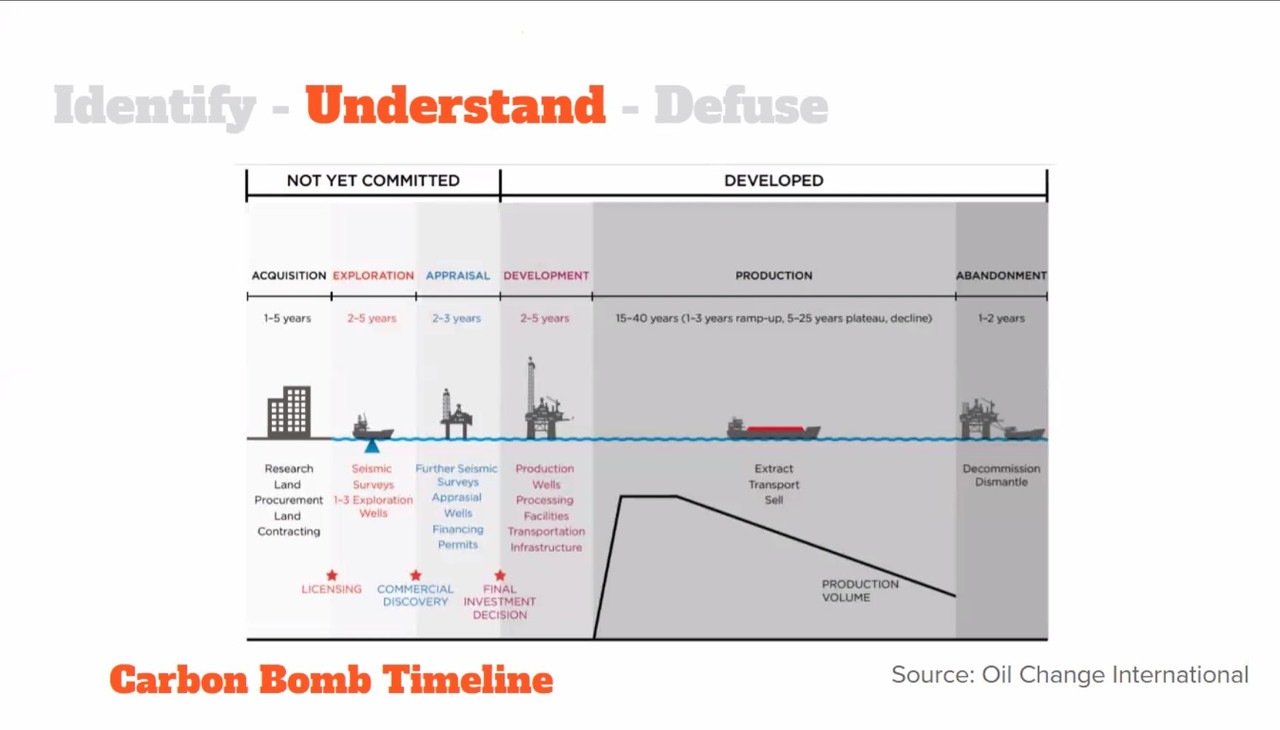
Big projects take lots of time and there are many players involved, which offers many potential points of intervention to stop them. To achieve that, a global, climate-friendly, bottom-up approach is needed.
Considering that the emission of 1 Gigaton of CO2 amounts to approximately 225,000 deaths and $418 billion in damages, millions of lives and trillions of dollars could be saved this way. One of the possible intervention points is researching the supply chains, identifying important project partners in areas such as insurance, finance, logistics, sales, refining, etc. and publishing information about their involvement to force these companies to submit to public pressure and pull out of these projects.
Another way to stop these projects is using litigation to force courts and governments to investigate the projects and punish companies for breaking laws as well as creating publicity for these issues. It is also important to reverse the reframing of harmful energy sources by the fossil fuel industry to green and sustainable alternatives.
For example the renaming of fossil gas to natural gas has led the population to believe that it is environment-friendly. In reality however, it is methane, a greenhouse gas with a big short-term impact. Decreasing the use of methane would have immediate impacts such as saving lives and protecting the environment.
Samuel Okulony from the Environment Governance Institute Uganda and StopEACOP held a presentation about the importance of stopping the construction of the East African Crude Oil Pipeline (EACOP) through Uganda and Tanzania, a carbon bomb in the midst of Africa.
TotalEnergies, The Uganda National Oil Company, the Tanzania Petroleum Development Corporation and CNOOC Limited are the shareholders of the pipeline, which will be electrically heated to above 50°C and has a peak capacity of 246,000 barrels of crude oil. It will be 1,443 km long, of which 470 km will run through the Lake Victoria Basin.
Lake Victoria is crucial for the region as it directly supports the livelihoods of more than 40 million people in the region.
Over a period of 25 years, the project will generate over 379 million tonnes of CO2 emissions, which would exceed France’s national emissions in 2020, which amounted to 277 million tons of CO2. The implementation of EACOP will seriously worsen the severity of the global climate emergency.
Over 13,292 households or over 86,000 people in Uganda and Tanzania are affected by the project. Many of them had to move houses and 3,500 households were displaced economically. Nearly 2,000 sq. km of protected wildlife habitats are affected by the pipeline construction, which threatens vulnerable species such as chimpanzees or elephants as being able to traverse through these reserves is critical for their survival.
Mitigating climate change will require united efforts from people, governments and companies from all around the world. Because of that the construction of a massive crude oil pipeline amidst a climate emergency goes against any rational judgment. Should the involved companies refuse to listen to the scientific evidence opposing the project, the StopEACOP Initiative proposes approaching banks and insurance companies to prevent the financing and insuring of EACOP and putting an end to the project this way.
Joseph Kenson Sakala from Malawi works with LINGO and is part of the early stage resistance against oil exploration in Lake Malawi. He works together with communities to build awareness and to create a dialogue with the government to stop the oil project which would cover the entire lake area. He is working on establishing a community of people who collaborate to resist the project and to ensure that people’s lives and their livelihoods as well as nature are protected and prioritized over financial profits. The lake has a large variety of fish species, some which were only recently discovered, and it is the economic basis for many rural communities, which are already feeling severe effects of climate change.
A cyclone in March displaced half a million Malawians and destroyed a lot of important infrastructure and buildings. The educational sector was also heavily affected by the catastrophe and many of the schools still have not opened. Joseph was visiting one school which was still struggling with the aftermath of the cyclone during the webinar. One of the teachers told us about the terrible situation there and how they were trying to cope with it to enable students to visit school nonetheless.
As the children have to help at home with repairs during the day, the school has started to hold classes in the late afternoon or in the evening before it gets dark. On top of that they are teaching students mostly outside as the cyclone also heavily damaged buildings.
This shows how climate change affects many different areas and thus how important combatting it is.
Yegeshni Moodley from groundWork from South Africa presented the work she and the organization did regarding fossil fuel projects. At the moment there is one existing carbon bomb in South Africa and there are six more which are in planning. Most of them are coal mines and oil and gas projects.
An important part of Yegeshni´s work is empowering communities to make meaningful contributions to protecting the environment. She works together with communities to listen to their problems and opinions and looks for ways together with them how these can be solved. She is an advocate for social justice and youth development in South Africa.
On top of that she is a member of the Life After Coal Campaign which discourages the development of fossil fuel projects in South Africa. An important achievement in the fight against fossil fuel projects was the first climate impact study for a new project in 2018, which became the benchmark for future projects.
Right now they are preparing a constitution case about fossil fuel projects and how they threaten future generations of South Africans. By doing this as well as advocating for the development of renewable energies and the restoration of damages created by fossil fuel projects and looking for ways in which energy efficiency can be improved, the campaign hopes to bring South Africa on the right track to overcome the problems and challenges that fossil fuels and climate change pose for a healthy environment and population.
Ken Henshaw from the NGO, We the People, in Nigeria talked about the natural gas projects in the Niger Delta and their horrible consequences for the local population and environment. Currently, oil and gas from the Niger Delta goes to Europe and countries in West Africa up to Morocco.
The environmental consequences of oil and gas extraction in the delta are disastrous: farming lands are contaminated by regular oil spills, people are being kicked out of their homes by oil companies who drill for oil on their lands, many people suffer from diseases and health issues, which have been scientifically linked to the extraction of fossil fuels, and the air is polluted because of the flaring of methane, which was originally outlawed in 1979, but law enforcement is still non-existent over 40 years later.
Revenues from crude oil and gas extraction make up 90% of the country’s income.
However, barely anything of it goes back to the local population. Most Nigerians are still very poor and live under bad conditions which result in a very low average life expectancy of 53 years. However, in the Niger Delta, where all of the oil and gas extraction takes place, the life expectancy is even more than ten years lower with only 41 years.
We The People demands the stop of oil and gas extraction in the Niger Delta as well as the stop of the establishment of new coal mines in the area. Ilham Rawoot from JA! in Mozambique talked about her work with communities affected by extraction companies in Mozambique. A natural gas project in Mozambique which was backed by Total, Eni, Exxon, HSBC and many governments has led to mass displacements, the death of 4,000 civilians and the militarization of the project area. Following the ongoing insurgency in Cabo Delgado, in the north of the country where the project is located, Total paused the project.
JA! is now working on stopping the project completely before Total returns to construction. They do that by mobilizing communities, writing letters to involved governments and confronting shareholders at shareholder meetings.
Kwami Kpondzo from the Center for Climate & Environmental Justice Centre in Togo talked about efforts to prevent potential extraction of fossil fuels. Following the initial discovery of oil and gas in the country in 2011, companies started planning off-shore extraction projects.
Kwami is mobilizing communities against these plans. Many communities in Togo feel the effects of climate change as their houses are destroyed because of the rise of sea water levels. Additionally, fishery has decreased significantly because a lot of the fish stay close to the pipelines in the ocean but fishers are not allowed to go near them.
Africa is heavily impacted by the climate crisis and continuing the extraction of fossil fuels will only make this worse. Combatting drivers of climate change such as the extraction of fossil fuels is crucial for reversing climate change. Instead of just fighting the symptoms, the problem has to be addressed at the root.
Unfortunately, many of the African leaders are corrupt and still believe in false solutions such as carbon sequestration or offsets, which benefit the finance sector and oil companies, but not the people. The leaders do not want to learn from their past mistakes and they actively decide to continue their irresponsible way of promoting fossil fuel extraction.
Making people understand that leaving oil and gas in the ground is beneficial for them is imperative as this is the only possible way to prevent the continuous extraction of oil and gas and to achieve the reversal of climate change.


